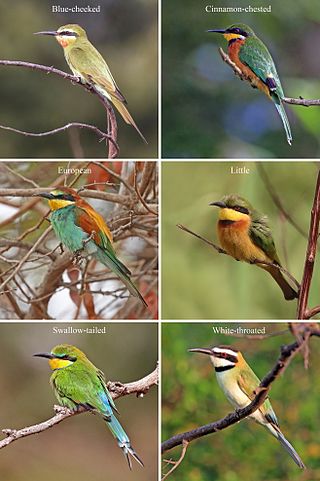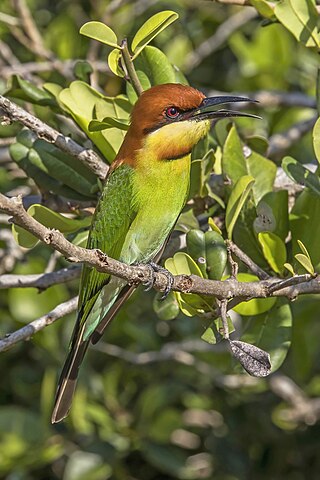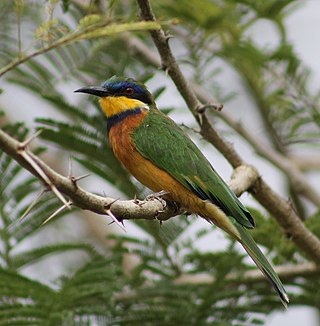
The bee-eaters are a group of birds in the family Meropidae, containing three genera and thirty-one species. Most species are found in Africa and Asia, with a few in southern Europe, Australia, and New Guinea. They are characterised by richly coloured plumage, slender bodies, and usually elongated central tail feathers. All have long down-turned bills and medium to long wings, which may be pointed or round. Male and female plumages are usually similar.

The European bee-eater is a near passerine bird in the bee-eater family, Meropidae. It breeds in southern and central Europe, northern and southern Africa, and western Asia. Except for the resident southern African population, the species is strongly migratory, wintering in tropical Africa. This species occurs as a spring overshoot north of its usual range, with occasional breeding in northern Europe.

The blue-cheeked bee-eater is a near passerine bird in the bee-eater family, Meropidae. The genus name Merops is Ancient Greek for "bee-eater", and persicus is Latin for "Persian".

The blue-tailed bee-eater is a near passerine bird in the bee-eater family Meropidae. It is widely distributed across South and Southeast Asia where many populations are strongly migratory, and seen seasonally in many parts but breeding colonially in small areas across their range, mostly in river valleys, where they nest by tunneling into loamy sand banks. They are seen mostly in open habitats close to water.

The Asian green bee-eater, also known as little green bee-eater, and green bee-eater in Sri Lanka, is a near passerine bird in the bee-eater family. It is resident but prone to seasonal movements and is found widely distributed across Asia from coastal southern Iran east through the Indian subcontinent to Vietnam. Populations in Africa and the Arabian Peninsula that were formerly assigned to this species are now considered distinct species: the African green bee-eater and the Arabian green bee-eater. They are mainly insect eaters and they are found in grassland, thin scrub and forest often quite far from water. Several regional plumage variations are known and several subspecies have been named.

The chestnut-headed bee-eater, or bay-headed bee-eater, is a bird in the bee-eater family Meropidae. It breeds on the Indian subcontinent and adjoining regions, ranging from India, Bangladesh and Sri Lanka across Southeast Asia to Indonesia.
Two species of bee-eater have occurred as wild visitors to Britain, with two further species having occurred as an escape from captivity.

The rainbow bee-eater is a near passerine bird in the bee-eater family Meropidae.

The blue-bearded bee-eater is a species of bee-eater found in much of the Indian subcontinent and parts of Southeast Asia. This bee-eater is found in forest clearings. It is found mainly in the Malayan region but extends west into peninsular India. The blue feathers of its throat are elongated and often fluffed giving it its name. They have a loud call but are not as gregarious or active as the smaller bee-eaters, and their square ended tail lacks the typical "wires" made up of the shafts of the longer central tail feathers found in many other bee-eaters.
Leschenault may refer to:
Algae eater or algivore is a common name for any bottom-dwelling or filter-feeding aquatic animal species that specialize in feeding on algae and phytoplanktons. Algae eaters are important for the fishkeeping hobby and many are commonly kept by aquarium hobbyists to improve water quality. They are also important primary consumers that relay the biomass and energy from photosynthetic autotrophes up into the food web, as well as protecting the aquatic ecosystem against algae blooms.

The southern carmine bee-eater is a species of bee-eater found across sub-equatorial Africa. It was formerly considered conspecific with the closely related northern carmine bee-eater, with the combined species then known as carmine bee-eater.

The red-throated bee-eater is a species of bird in the family Meropidae. This species is native to the Sudan (region). It has a wide range and large total population, and the International Union for Conservation of Nature has assessed its conservation status as being of "least concern".

Mallophora is a genus of bee killers in the family Asilidae. There are about 60 described species in Mallophora.

Mallophora fautrix is a species of robber fly in the family Asilidae.
Mallophora atra, the black bee killer, is a species of robber flies in the family Asilidae.
Mallophora ruficauda is a species of parasitic robber fly in the family Asilidae, endemic to South and Central America. Like other robber flies, M. ruficauda is known for its aggressive behavior and predation upon other insects, especially bees. M. ruficauda mimics a bumblebee to fool predators into thinking it has a painful sting and is not worth eating.

The Ethiopian bee-eater is a species of bird in the family Meropidae. It is found in Ethiopia and Sudan. It was formerly considered a subspecies of the blue-breasted bee-eater.

El Gallo Taqueria was a Mexican restaurant in Portland, Oregon, United States. Owner and chef Jake Brown established the business as a food cart in 2009, in southeast Portland's Woodstock neighborhood. In 2015, El Gallo relocated and began operating as a brick and mortar restaurant in 2015. The business closed in 2022.

Hapa PDX is a restaurant in Portland, Oregon.
















